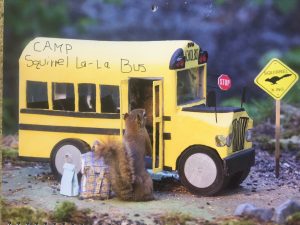The Moxy Roxy Blog Is Here!
Welcome to this blog...

December 2021
Photo is courtesy of Nancy Rose. I dedicate this poem to a fox squirrel named Rikki who succumbed recently to his illness that I tried to cure. I made him as comfortable as possible in his final days. Some lyrics and rhythm of this poem is taken from Allan Sherman’s 1963 parody song: ‘Camp Granada’. Rikki the squirrel is attending Camp Squirrel-La-La, and is writing to his parents:

Camp Squirrel-La-La
Hello Muddah, hello Faddah
I’m now at Camp Squirrel-La-La
Camp is very entertaining
And we’ll have more fun when it stops raining
I went hiking with my bunkmate
We found many juicy berries which we ate
Our human director is a squirrel lover
A good thing since we’ll be here all summer
We have squirrel counsellors and waiters
And the lake has no alligators
And the head coach is the greatest
To be healthier squirrels, they’re trying to make us
It’s so much fun playing with the other squirrels
The obstacle course even has fences to hurdle
All this exercise keeps our appetites hardy
So at the end of day, we just like to eat & party
Met a girlfriend, her name is Clare
Told me about her encounter with a bear
This place taught me not to be such a klutz
All of us frequently get rewarded with nuts.
Though I miss you Muddah & Faddah
I obviously love Camp Squirrel-La-La
I think about you all the time
As great parents, you’ve been very very kind
Dearest Fadduh, darling Muddah
How’s my precious little sisstah
Let me come home if you miss me
I want you both to hug and kiss me
Though I love everyone at Camp Squirrel-La-La
It’s certainly a place like no other
All I know is all the love you’ve shown
Now I’ve learned there’s no place like home
RIP Rikki as you forever frolic over the ‘Rainbow Bridge’………….
November 2021
The most common animal to invade the attic of a house is the Eastern Gray Squirrel (Sciurus carolinensis) which lives throughout most of the United States and the west coast. These adaptable urban rodents are adept at climbing, exploring, and chewing. They like to live in tree hollows or self-constructed nests in trees, but have found that the attics of buildings provide superior shelter. Squirrels give birth twice per year, once in late summer, and once in late winter, and the pregnant female instinctually seeks out a safe den in which to raise her young. If you have a squirrel in the attic, it’s almost certainly a female with a litter of 3-5 babies.
How do you know if you have squirrels in your attic? The most common sign is the noise. Squirrels are active during daylight hours, particularly morning and late afternoon. If you hear noise in the attic during the day, it’s almost surely squirrels. If you hear noise in the attic at night, it’s more likely rats, mice, raccoons, or even flying squirrels. An inspection inside the attic can also help, if you discover squirrel feces, tracks, or nesting material. However, you may not spot these things, because the activity might be down in the soffit, or concealed by insulation. A thorough inspection of the exterior of the home should reveal some open entry holes. The primary entry hole will likely have some chewing marks.
It is our goal to provide complete instructions for the safe, effective, and humane removal of squirrels from buildings. In short, here is how to get rid of squirrels in the attic:
- Inspect inside the attic to confirm squirrels, and the exterior of the house, especially eaves and roof vents, to find all entry holes.
- Listen carefully. If you hear only one animal, it’s a female with a nest of immobile babies. Wait a few weeks until they grow up, and are all active.
- Use metal flashing to seal all secondary entry holes. Then use screws and washers to bolt a one-way exclusion door over the primary entry/exit hole. You can purchase one or make one. Wait two days to ensure that they are all out, and you hear no more noise. If you do hear noise, remove the one-way door at once and try again in a week.
- Once they are all out, remove the door and seal the last hole. Always use steel mesh or metal flashing to prevent re-entry by chewing.
